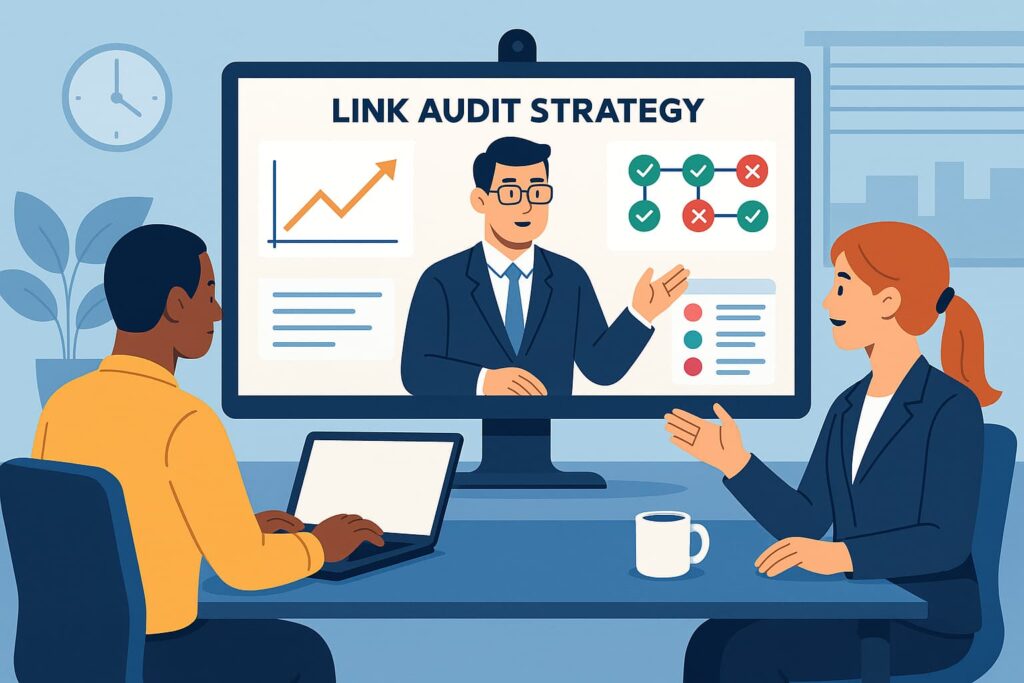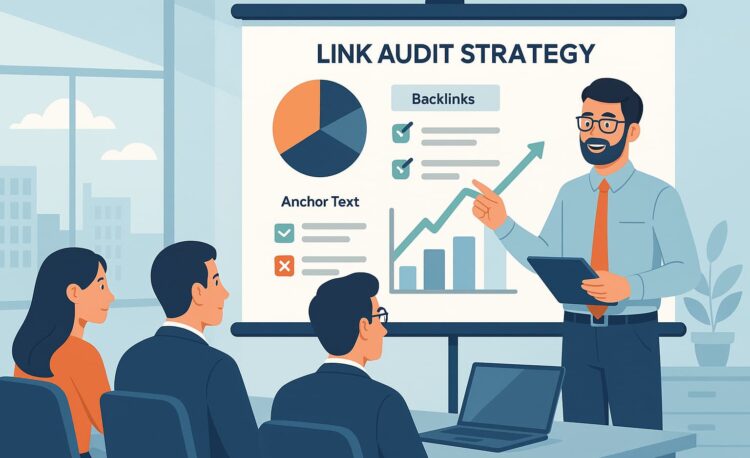A proper link audit reviews all websites linking to yours and identifies low-quality or harmful backlinks that may affect your search rankings. It’s more than basic maintenance—it helps prevent Google penalties and supports stronger search performance. While basic in-house audits can work at first, professional support is often necessary as backlink profiles grow more complex.
This guide cuts through the confusion to show you exactly when DIY methods work and when you need an experienced SEO team. We’ll explain how professionals spot hidden risks and opportunities that most businesses miss, and help you determine whether your situation calls for that deeper level of analysis.
Why Are Link Audits Important?
Link audits are a key part of maintaining your site’s search performance. Without regular checks, harmful backlinks can go unnoticed and gradually affect your rankings.
Here’s why they matter:
1. Avoid Google Penalties
Google doesn’t mess around with shady backlinks. If your site has spammy or artificial links, you could face:
- Unexpected ranking drops;
- Complete removal from search results (in worst cases).
The smart move? Run regular link audits to find and remove bad links before they hurt you. Here’s the kicker — most website owners don’t know they have a problem until Google slaps them with a penalty. And trust me, digging out of that hole takes forever and costs a fortune.
Keep your backlink profile clean by doing frequent checks. It’s the most effective approach to protect your rankings and avoid unpleasant surprises from Google.
2. Improve SEO Performance
Not all backlinks are created equal. Low-quality links hurt you, while high-quality links push you higher in search results. A proper audit helps you:
- Cut ties with toxic sites, dragging your rankings down.
- Find and keep valuable links from trusted sources.
- Build stronger relationships with authoritative websites linking to you.
When search engines recognize that your website has a clean, natural backlink profile, they are more inclined to reward you with higher ranks and continuous organic traffic.
3. Competitor Analysis
Looking at where your competitors get their backlinks can help you find good linking opportunities for your own site. When you analyze their link sources, you might discover relevant websites that could also link to your content. This isn’t about copying them — it’s about finding potential partners you may have missed.
This analysis also reveals where your existing link-building approach may be falling short. If you discover that competitors are frequently receiving connections from specific industry magazines or influencers, you’ll know where to direct your outreach efforts.
Essentially, competition backlink data provides a blueprint for increasing your own link profile. It demonstrates what’s working in your sector, allowing you to make better judgments about where to invest your time and resources.
4. Recovery from Past Penalties
Got penalized? Your first move should be a link audit. Without cleaning up bad links:
- Recovery efforts are useless.
- Your disavow file will be incomplete.
- Rankings won’t come back.
The bottom line? Link audits aren’t optional if you care about your search traffic. They’re the difference between controlling your SEO destiny and hoping Google doesn’t notice your backlink problems.
When to Conduct a Link Audit

Link audits aren’t a “set it and forget it” task—they’re crucial for keeping your website in good shape. While routine checks help maintain your site’s health, some situations call for an immediate deep dive into your backlinks. Here are the key times to prioritize a full audit:
1. After a Google Algorithm Update
Google’s updates (like Penguin) often crack down on spammy or unnatural backlinks. If your rankings suddenly drop without explanation, a link audit should be your first move.
Many sites get hit because of old, risky link-building tactics they used years ago. By checking your backlinks after major updates, you can spot and remove harmful links before they seriously damage your search visibility.
2. Before Migrating or Redesigning Your Website
When moving or redesigning a site, most businesses focus on technical SEO but forget about their backlinks. Auditing your links beforehand helps avoid making existing problems worse with new technical issues.
A pre-migration audit can also help you protect important backlinks by implementing correct redirects. This way, you won’t lose any SEO value from high-quality sites connecting to you.
3. After Buying an Existing Website
Purchasing an established website often means inheriting its backlink history, both good and bad. Many website buyers discover too late that their new asset comes with toxic links that could trigger penalties.
A thorough link audit should be part of your due diligence process before finalizing any website purchase. This allows you to either negotiate a better price if cleanup is needed or develop a remediation plan before transferring ownership.
4. When Receiving a Manual Penalty
A manual penalty notification in Google Search Console is essentially Google’s red flag that your link profile violates their guidelines. Ignoring this warning can lead to devastating consequences for your organic traffic.
In these cases, a comprehensive link audit isn’t just helpful — it’s mandatory for recovery. The audit will form the foundation of your reconsideration request, showing Google you’ve identified and addressed all unnatural links.
5. As Part of Regular SEO Maintenance
Even if there aren’t any obvious problems, schedule link audits every six to twelve months.
Regular audits assist in identifying issues early, evaluating link-building effectiveness, and maintaining your backlink profile in compliance with Google’s rules. This lessens the possibility of gradual ranking declines.
How to Conduct a Link Audit
A link audit may be completed efficiently by following a basic, step-by-step process. Whether you’re responding to a ranking issue or performing a routine check, a thorough approach guarantees that critical issues aren’t missed.
Step 1: Gather Backlink Data
Use tools like:
- Google Search Console (under “Links” report);
- Ahrefs or SEMrush (for comprehensive backlink analysis);
- Moz Link Explorer.
Export your backlink data from at least two sources. Google Search Console offers the most reliable data, while third-party tools may reveal additional links. Combining sources ensures a more complete and accurate backlink profile.
Step 2: Filter and Categorize Links
Sort links into categories:
- High-quality links,
- Low-quality links,
- Toxic links.
To stay organized, keep a detailed spreadsheet that tracks each link’s category and priority level. Pay close attention to warning signs like shady domains, unnatural anchor text, or ties to known link schemes.
This organized strategy assists you in determining which links to maintain, which to eliminate, and where to direct your future link-building efforts for the greatest outcomes.
Step 3: Assess Link Quality
Check for:
- Anchor text over-optimization (exact-match spammy anchors);
- Link sources (guest posts, forums, PBNs);
- Domain Authority (DA) & Spam Score (using Moz or Ahrefs).
Evaluate each backlink carefully, taking into account the quality of the linking page’s content, its relevance to your website, and the domain’s general reliability. High domain authority alone does not guarantee a beneficial link, especially if the content is of low quality or irrelevant.
Be wary of red signals such as too many outbound links, weak content, or links included in footers or site-wide widgets. While tools like Moz Spam Score and Ahrefs Domain Rating are beneficial, a thorough check is required for accurate evaluation.
Step 4: Remove or Disavow Bad Links
First, contact webmasters to remove the worst links, keeping records of your requests. For links that stay despite your efforts, use Google’s disavow tool — but be careful. Only target truly harmful links, as removing good ones can hurt your rankings.
Always:
- Save a backup of your disavow file;
- Note why you’re blocking each link;
- Plan to review and update it later.
This careful approach protects your site while keeping valuable links intact.
Step 5: Monitor and Reassess
Once you’ve made changes, keep an eye on your rankings and any updates in Google Search Console. If you’re recovering from a penalty, plan to run a new audit every 3–6 months. For general upkeep, every 6–12 months is usually enough.
Backlink profiles aren’t static—new harmful links can appear, and your disavow file may need adjustments as you continue building links through ongoing marketing.
When to Use Professional Link Audit Services

Basic link audits might work for smaller websites, but there are situations where professional help makes more sense:
1. For Large or Complex Backlink Profiles
If your website has hundreds of links from several referring sites, typical SEO tools and manual assessments will not suffice. Enterprise-level websites require specialized systems capable of handling enormous volumes of data effectively.
Professional services bring two key advantages here:
- They use advanced crawling technology and AI analysis to process large datasets quickly.
- Their expertise helps identify hidden patterns in toxic links that are easy-to-miss issues, like gradual link spam buildup or subtle network connections.
The reality is — when you’re dealing with extensive backlink profiles, professional audits save time while providing more accurate, actionable results than DIY approaches can deliver.
For enterprise sites with extensive backlink profiles, 3XE Digital offers professional link audit services that combine advanced data analysis with manual review to uncover toxic links, assess anchor text, and deliver tailored recommendations.
2. Google Penalty Recovery
Professionals can efficiently identify and disavow toxic links to lift penalties faster, often because they’ve handled hundreds of similar cases. They understand exactly what Google’s webspam team looks for in reconsideration requests.
More importantly, experienced consultants know which links truly need disavowing versus those that might appear problematic but are actually harmless. This discernment prevents the common mistake of over-disavowing, which can unnecessarily limit your link equity and slow recovery.
3. Lack of In-House SEO Expertise
If your team lacks SEO experience, hiring experts ensures accuracy in both identifying problematic links and implementing the right solutions. Link audits require nuanced judgment calls that go beyond simple “good link/bad link” classifications.
Professionals also stay current with Google’s evolving policies. What might have been considered an acceptable link-building tactic two years ago could now be grounds for penalties — knowledge that only comes from daily immersion in SEO.
4. Competitive Industries
In tough markets like finance, legal, or healthcare, professional audits provide insights that basic tools can’t match. Experts know what a healthy backlink profile looks like in your specific field.
They compare your links against competitors to spot:
- Where you’re falling behind.
- Quality link opportunities you’ve missed.
- Industry-specific risks to avoid.
5. Legal or Reputation Risks
Some toxic backlinks originate from harmful sources like spam networks, adult sites, or competitors using negative SEO tactics. Professional services remove these carefully to limit brand exposure.
Reputable agencies maintain proper documentation in case legal action is required. They follow secure removal procedures for links connected to blackhat networks while preserving relationships with legitimate sites through tactful outreach. Their experience ensures problematic links get removed without collateral damage to your business connections.
Choosing the Right Link Audit Service
When selecting a link audit provider, focus on these essential factors:
- Penalty recovery track record — Proven experience fixing Google penalties.
- Professional tool access — Ahrefs, SEMrush, or Majestic capabilities.
- Transparent reporting — Clear, actionable findings you can understand.
- Verified case studies — Real examples of successful audits.
For reliable options, consider Ahrefs or SEMrush certified partners — their certification ensures baseline expertise. Specialized SEO firms often deliver deeper insights, especially for complex sites.
The evaluation process is important. Set up consultations with several providers to understand how each one works. Don’t focus only on pricing—choose a provider that understands your business goals and can clearly explain how their audit will improve your SEO.
Conclusion
Link audits play a key role in keeping your backlink profile clean, resolving penalties, and supporting better search rankings. Basic audits may work for smaller sites, but larger websites or those facing penalties typically require professional help for a deeper review.
Whether done in-house or by specialists, regular audits help maintain SEO performance and support long-term growth.
